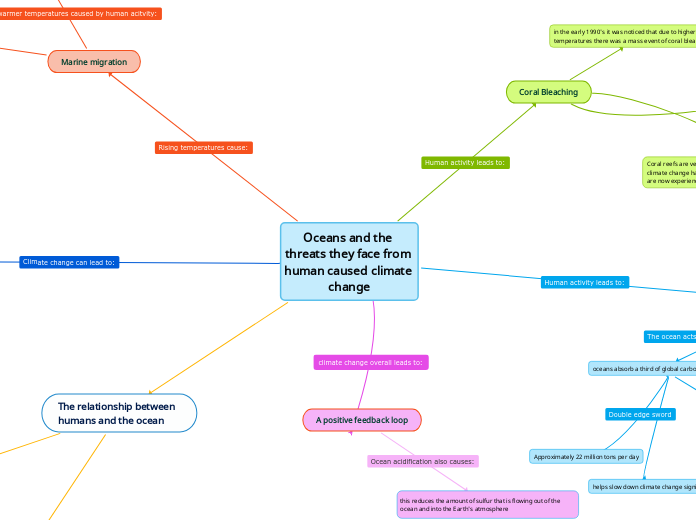Oceans and the threats they face from human caused climate change
Rising sea levels
coastal flooding
Flooding is also becoming more prevalent along coastlines (especially in North America)
The rate of coastal flooding is also accelerating on the East and Gulf coasts
Plant materials used for fuel
drowning wetlands
Oceans absorbing heat, which ultimaetly causes sea levels to rise also drown wetlands, although wetlands grow vertically pretty quickly to keep up with regular increases in water levels, sea levels rising is causing a much larger distrubance
Coral reefs and sea grass meadows are also drowning
Marine migration
As the ocean warms fish move to their preferred tempratures
They either move towards the poles of the earth or deeper into the ocean
This effects fisheries as they will no longer have access to as many fish as they would have
Warmer ocean temperatures cause vital nutrient depletion for marine life
The ocean is warmer than it was at any time since the 1880s
The relationship between humans and the ocean
The ocean is a vital resource for human activity, humans have a very anthropocentric view for this resource
Higher levels of development can
lead to higher levels of consumption
of products and resources
this ultimately leads to more run off going into the ocean
This toxic run off from the disposal of chemicals and due to the consumption of goods and services harms marine life as the run off can be microscopic and can be consumed by marine life
Since humans sit at the top of the food chain
we end up consuming this toxic run off in the water
leads to a various range of health problems: reproductive issues, hormonal issues, organ damage, etc.
Ocean acidification
oceans absorb a third of global carbon emissions
Approximately 22 million tons per day
helps slow down climate change significantly
Although the ocean absorbs a significant amount of global carbon emissions and helps combat climate change, this has caused ocean acidification to increase 30 times than the natural variation
This is a 25% increase in ocean surface pH levels
Higher acidification also causes harm to marine species that need calcium carbonate to form skeletons and shells
also impacts ecosystems such as coral reefs that depend on calcium carbonate for the formation of reef structures
Coral Bleaching
in the early 1990's it was noticed that due to higher global temperatures there was a mass event of coral bleaching
Coral bleaching leads to the starvation/shrinkage/death of coral reef
The coral acts as a habitat and also helps the functions of various species which is now threatened
Coral reefs are very sensitive to temperature, and since climate change has become more and more prevalent oceans are now experience more marine heat waves
A positive feedback loop
this reduces the amount of sulfur that is flowing out of the ocean and into the Earth's atmosphere
This further reduces the reflection of solar radiation back into space, and ultimately leads to more warming and higher temperatures
